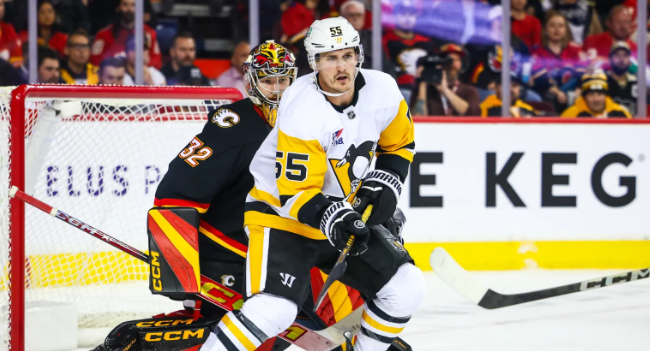The Montreal Canadiens lost forward Juraj Slafkovský late in the third period when Pittsburgh’s Noel Acciari delivered a hard hit to his head. With just over three minutes left in the game, Slafkovský’s departure raised concerns regarding the hit’s legality and how his team should react. This prompted Montreal players to take the ice in defense of their teammate, resulting in a heated confrontation between the teams.
This incident leads to a closer look at the hit, the Canadiens’ response, and its implications for both teams moving forward.
There is a split opinion on whether Acciari’s hit was “dirty” or not. The situation unfolded with both players pursuing the puck near the boards. While Slafkovský backed off, Acciari charged in with full commitment, extending his elbow, which ultimately struck Slafkovský’s head and forced him to leave for evaluation.
The timing and angle of the hit were critical. Acciari approached aggressively, making high contact, which sparked immediate concerns about the safety of Montreal’s first-overall draft pick. Some believe the hit was reckless instead of malicious, suggesting that Acciari might not have aimed for a high strike. However, any contact between an elbow and a head raises alarm, especially for a young player with a promising future.
In response, the Canadiens acted quickly. As soon as the game ended, Arber Xhekaj confronted Acciari to show their commitment to protecting their key rookie. This reaction was about more than retaliation; it was about safeguarding a teammate they cared for deeply. For the Canadiens, defending Slafkovský was an expression of solidarity and a pledge to shield their young stars from risky plays.
Kevin Bieksa remarked during the broadcast that if no action had been taken, it would have suggested a lack of unity within the Montreal team. Hockey culture highly values loyalty, and standing up for a teammate, particularly a prominent rookie, fosters team chemistry. Analysts on the Hockey Night in Canada panel commended the Canadiens for intervening, noting that failing to protect Slafkovský could raise doubts about the team’s cohesiveness. This moment of unity strengthens internal bonds, reassuring players that they will be supported.
The discussion also turned to whether Pittsburgh’s coaching staff should have removed Acciari following the hit. Keeping him on the ice heightened the likelihood of further altercations as tensions flared. Analysts pointed out that some coaches would opt to pull a player in similar situations to alleviate tension and avoid further penalties or injuries. In this instance, allowing Acciari to remain contributed to an emotional and aggressive conclusion to the game, with both teams risking penalties as time expired.
Slafkovský’s condition remains unclear, but he will have a few days to recuperate before Montreal faces Calgary. This incident could prompt a reevaluation of the league’s stance on high hits and may lead to disciplinary actions against Acciari.
For the Canadiens, this incident strengthens their culture of loyalty and protection for their rising star, reinforcing their commitment to looking out for one another in tense situations.
